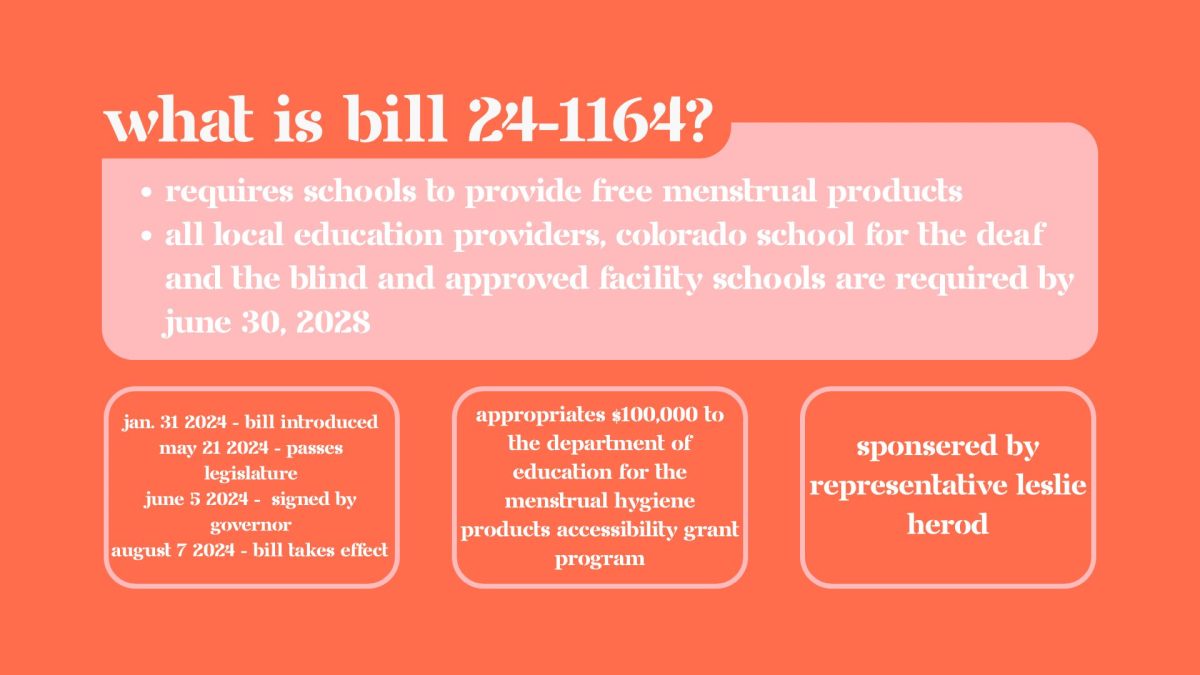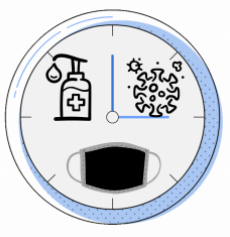To vax or not to vax
What you need to know about the vaccines and a collection of student opinions.
April 29, 2021
Numerous cars move along a quick-paced vaccine line, vaccines go into arms, then cars driving into parking spaces in order to wait out the emergence of possible side effects. Across the country, people are signing up to get their COVID vaccines. Some go to mass vaccination events, while others hope to get an appointment. In Colorado, everyone over the age of 16 is now eligible to sign up for a vaccine as of April 2.
Three vaccines are currently approved for emergency use in the United States: Moderna/Oxford, Pfizer/BioNTech, and Johnson and Johnson (J&J).
The Pfizer-BioNTech and Moderna vaccines use mRNA, which creates programmed proteins to fight COVID, according to the CDC. These proteins, once activated, fight COVID because they produce antibodies.
Unlike the Moderna and Pfizer vaccines, the Johnson and Johnson vaccine is a vector vaccine, which is a modified version of a virus, according to Mayo Clinic. Vector vaccines are commonly used for viruses, according to the CDC. While the Johnson & Johnson vaccine is 66% effective at preventing COVID with any symptoms, it is 85% effective at preventing severe symptoms.
The vaccine is designed to provide herd immunity, according to Health teacher Chrissie Marcilliat.
“By definition alone, herd immunity speaks to a large population of individuals being immune from a disease,” Marcilliat said. “The COVID vaccine is designed to do just this. As more individuals become immunized, their risk of contraction goes down as well as their risk of severe illness and hospitalization.”
An article by Johns Hopkins University explains the testing process. COVID vaccines are tested continuously and are monitored by authorities.
“Vaccine Data Link (VSD) can analyze healthcare information from over 24 million people,” the CDC said. “Post-Licensure Rapid Immunization Safety Monitoring (PRISM) can analyze healthcare information from 190 million people.”
However, some adverse reactions have occurred. Swelling of the arm is common, and according to the CDC, the Moderna vaccine could have possibly contributed to vomiting and facial swelling in two people.
“I just felt really sore, cold and extremely tired,” Sydney Bowman ‘21 said. “My arm was also really sore and it was hard to move it around for a few days.”
Women have also experienced side effects pertaining to their menstrual cycles including heavy or irregular bleeding. Women have reported side effects from COVID-19, which gives insight into the vaccine side effects.
“A small study of 233 women of childbearing age with clinically diagnosed COVID-19 reported some menstrual changes,” Korin Miller of Healthline said. “Of the 177 patients with records about their periods, 25% had ‘menstrual volume changes,’ 20% had a lighter-than-usual period, and 19% had a longer-than-usual cycle.”
There is debate as to whether more serious side effects have occurred because of the vaccine, or if it was coincidence.
“The possibility that the vaccine contributed to the serious adverse event reports of rheumatoid arthritis (n=1), peripheral edema/dyspnea with exertion (n=1), and autonomic dysfunction (n=1) cannot be excluded,” according to the FDA brief for the Moderna vaccine.
Rheumatoid arthritis is an autoimmune disease that causes joint pain, according to Healthline. Common symptoms are swelling and pain. Peripheral edema/dyspnea is a combination of swelling of limbs and difficulty breathing, according to the NIH. Autonomic dysfunction is a condition that causes tachycardia and dizziness, along with other symptoms.
According to the CDC, there have been 3,848 reports of death after receiving one of the COVID vaccines as of April 27. However, the CDC says there has been no evidence to prove that the vaccine caused these deaths.
“CDC and FDA physicians review each case report of death as soon as notified and CDC requests medical records to further assess reports,” the CDC website said. “A review of available clinical information including death certificates, autopsy, and medical records revealed no evidence that vaccination contributed to patient deaths.”
The Johnson and Johnson vaccine halted in many places in the U.S. from April 13-27, according to the New York Times.
“Federal health agencies called for a pause in the vaccine’s use as they examine a rare blood-clotting disorder that emerged in six recipients,” New York Times reporters Noah Weiland, Sharon LaFraniere, and Carl Zimmer wrote.
According to Pew Research, about 69% of Americans say they want a COVID vaccine once it’s available to them.
“Vaccines are the clear answer to greatly assist in ending the COVID-19 pandemic,” Evan Sonin ‘22 said.
However, approximately 31% do not want to get a COVID vaccine. According to Vox, many of these people are afraid of possible side effects, while others do not trust the vaccine or how the government is promoting it.
“The vaccine to me looks like an experimental drug that’s being peer-pressured onto us,” Andrew Woodring ‘22 said.
Others do not want to get the vaccine because of the amount of time it has been out.
“The vaccine has not even been out for 6 months and we have no idea the long-term effect it has on people,” Amanda McGruder ‘21 said. “We also have no knowledge on how it could affect so
meone with pre-existing medical conditions.”
However, Biology teacher Susanne Petri suggests getting a vaccine if you can.
“I believe in the science of a vaccine, so I believe anyone who can get vaccinated should get vaccinated to protect both themselves and anyone who cannot get vaccinated for underlying health conditions,” Petri said.
If you want to get a vaccine, check this Colorado COVID website to find an appointment.



![Minutes before the Activities Fair in the gym, president Abhi Gowda ‘26 prepares the stall for his club Helping Hands, Sept. 4. A relatively new club, Helping Hands was co-started by Gowda and focuses on assisting the homeless, and just last year they succeeded in raising a couple hundred donations to send to shelters. This year, they have goals to expand, with hopes to increase volunteer opportunities and take in-person trips to shelters, as well as extend their help beyond just homeless people. “The Activities Fair gives a lot of underclassmen the opportunity to really get to know the Canyon culture, and it gives them many opportunities for service and volunteering,” Gowda said. “[Through the Activities Fair,] I hope to find a bunch of new and passionate members about our club and just get our name out there and spread awareness to the cause that we’re fighting for.”](https://rockmediaonline.org/wp-content/uploads/2025/09/1-2-1200x885.jpg)







![The winter guard team makes fifth place at the state championship finals in the Denver Coliseum, March 30. The team performed to Barnes Country's “Glitter and Gold,” lead by coaches Margo Sanford, Blair Bickerton and Anna Orgren. In their class there were a total of nine groups participating, and the top five who made it to finals received a plaque. “[Walking onto the stage] is very nerve-wracking, but also very exciting as well. When you first start color guard there's a lot of anxiety and uncertainty when you first perform in front of an audience, but once you've done it for a while, it starts to become the best part of the season,” Ella West ‘25 said. “It's very fulfilling to see an audience react to something you've put your heart and soul into.”](https://rockmediaonline.org/wp-content/uploads/2025/04/Both-socal-media-nd-website-main-1-1200x846.jpg)


![April marks the 25th anniversary of Sexual Assault Awareness Month, created by the National Sexual Violence Resource Center (NSVRC). This month is to spread awareness of the harassment, assault and abuse that happens around the world. The symbol that represented the month was a teal ribbon; however, some survivors of assault create different symbols and movements like the TikTok trend in 2022, where survivors would tattoo Medusa on their body, in honor of her backstory in Greek Mythology. “I don't think [this month is known] at all. I rarely see anybody talk about it. I rarely see much of an emphasis on posting it online, or much discussion about it, and I feel like there needs to be way more discussion,” an anonymous source said. “I think just validating every experience that a person has gone through, regardless of the degree of it, the severity, is an essential step into making sure that people are aware that this is a very real problem in a society and that we need to do better in addressing it.”](https://rockmediaonline.org/wp-content/uploads/2025/04/IMG_0011-1200x900.jpg)












![Lesbian Visibility Day is April 26, and it’s a holiday to celebrate the lesbian community of the world. Lesbian Visibility day was established in 2008 by many queer activists and organizations who sought to raise more awareness for lesbian history and culture. “So this is why during Lesbian Visibility [Day] we celebrate and center all lesbians, both cis and trans, while also showing solidarity with all LGBTQ+ women and nonbinary people,” Linda Reily, in an article written by her, said.](https://rockmediaonline.org/wp-content/uploads/2025/04/Lesbian-Visibility-day.jpeg)






